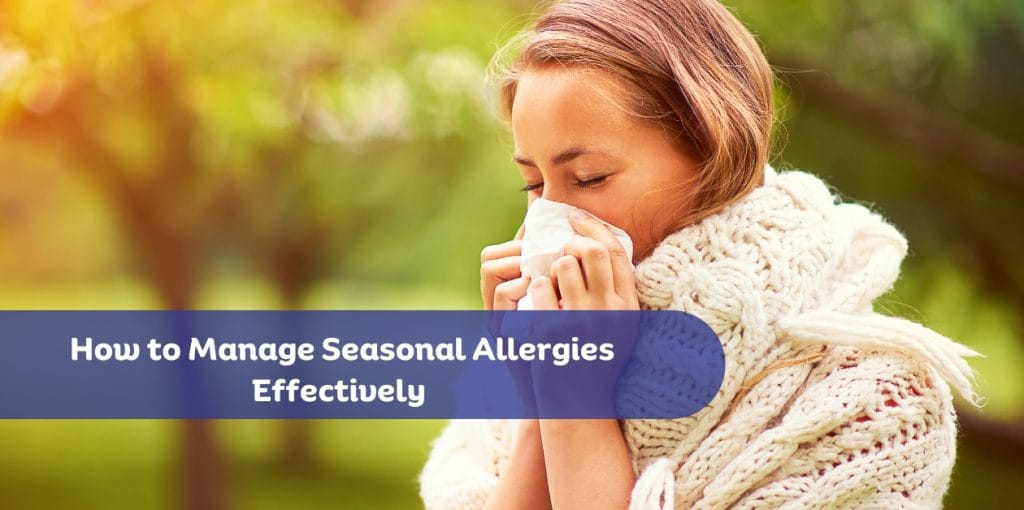How to Manage Seasonal Allergies Effectively

Seasonal allergies, also known as hay fever or allergic rhinitis, are a common issue affecting millions of people worldwide. These allergies, triggered by pollen from trees, grasses, and weeds, can cause uncomfortable symptoms such as sneezing, runny nose, itchy eyes, and headaches. Managing seasonal allergies effectively is essential to improving your quality of life, especially during peak allergy seasons.
In this blog, we will delve into how to manage seasonal allergies effectively, including the most common causes of headaches that often accompany allergies, and how are advancing allergy treatment.
Understanding Seasonal Allergies: Causes and Symptoms
Seasonal allergies occur when your immune system overreacts to airborne allergens, such as pollen, that are common during certain times of the year. The immune system mistakenly identifies these harmless particles as threats and releases chemicals like histamine to protect the body, leading to allergic reactions.
The most common triggers of seasonal allergies include:
- Pollen: Tree, grass, and weed pollens are the primary culprits.
- Mold spores: Mold can be released into the air during damp seasons.
- Dust mites: Though more common indoors, dust mites can also aggravate allergies in specific climates.
Common symptoms of seasonal allergies include:
- Sneezing
- Runny or stuffy nose
- Itchy or watery eyes
- Post-nasal drip
- Fatigue
- Headaches: Allergies often cause sinus pressure, which can lead to tension headaches or even migraines.
Managing Seasonal Allergies Effectively
While there is no cure for seasonal allergies, there are several effective strategies you can use to manage symptoms and improve your quality of life.
- Avoid Allergens Where Possible
The most effective way to manage allergies is to limit exposure to allergens. Here are some practical tips:
- Stay indoors during peak pollen times (usually early morning and late afternoon).
- Keep windows closed to prevent pollen from entering the house.
- Use air purifiers to filter pollen and other allergens from the air inside your home.
- Shower and change clothes after being outdoors to remove pollen from your skin and hair.
- Limit outdoor activities during high pollen count days, especially on windy days.
- Use Allergy Medications
Several over the counter and prescription medications can help alleviate symptoms of seasonal allergies:
- Antihistamines: These medications block the release of histamine, which helps prevent allergy symptoms like sneezing and itching. Common antihistamines include loratadine (Claritin) and cetirizine (Zyrtec).
- Nasal corticosteroids: These are anti-inflammatory sprays that help reduce swelling in the nasal passages and relieve congestion (e.g., fluticasone or budesonide).
- Decongestants: Oral decongestants (like pseudoephedrine) or nasal sprays (such as oxymetazoline) can help reduce nasal congestion.
- Eye drops: For itchy or watery eyes, antihistamine eye drops may provide quick relief.
- Consider Immunotherapy
Immunotherapy is a long-term treatment that involves gradually desensitizing the immune system to allergens. This can be done through:
- Allergy shots: Regular injections of allergens, which gradually reduce your sensitivity.
- Sublingual tablets: These dissolve under the tongue and help reduce allergic reactions over time.
While immunotherapy can take months to show significant effects, it is a long-term solution that can provide relief for several years.
- Natural Remedies
For those looking for more natural ways to manage allergies, consider the following:
- Nasal irrigation: Using a saline solution to rinse the nasal passages can help clear out allergens and mucus.
- Herbal supplements: Some studies suggest that butterbur and quercetin may help alleviate allergy symptoms, though it’s important to consult with a healthcare provider before starting any supplement.
Local honey: Some people believe that consuming local honey can help desensitize the body to pollen, though scientific evidence on this is limited.
The Link Between Allergies and Headaches
One of the most common symptoms of seasonal allergies is headaches, particularly tension headaches and sinus headaches. When the nasal passages become inflamed due to allergens, it can cause pressure in the sinuses, which may lead to headaches. Additionally, the inflammation caused by allergies can trigger tension headaches, as the body reacts to the discomfort and stress caused by congestion.
Conclusion
Managing seasonal allergies effectively requires a combination of strategies, including avoiding allergens, using medications, and considering long-term treatments like immunotherapy.
If you suffer from seasonal allergies, consider speaking to a healthcare professional for advice tailored to your specific needs. With the right approach, you can manage your symptoms and enjoy a better quality of life during allergy season.
FAQs
Allergies can cause sinus congestion and inflammation, leading to sinus headaches or tension headaches because of the body’s response to allergens.
Natural remedies like nasal irrigation with saline solution, herbal supplements like quercetin, and avoiding allergens can help alleviate symptoms. Always consult a healthcare professional before trying new remedies.
Yes, allergies can increase inflammation in the body, which may interfere with cancer treatments. PI Health Cancer Hospital is researching how to effectively manage both allergies and cancer therapies.
Antihistamines block histamine, a chemical involved in allergic reactions. Nasal corticosteroids reduce inflammation, and decongestants alleviate nasal congestion, all helping to manage allergy symptoms.
About Author
Dr. Y Swetha
MBBS ,MD General Medicine
Dr. Y Swetha is a skilled physician currently practicing at PI Health Cancer Hospital. She holds an MBBS from Kamineni Institute of Medical Sciences and an MD in General Medicine from Prathima Institute of Medical Sciences.Dr. Swetha has extensive experience in outpatient, inpatient, emergency, and critical care settings. She is proficient in managing chronic conditions, critical emergencies, and advanced procedures such as ventilator management and catheter placements.Her academic contributions include presentations on deep vein thrombosis, splenic infarcts, and cardiac tamponade. Dr. Swetha also volunteered as a Telemedicine Doctor during the COVID-19 pandemic, demonstrating her commitment to patient care.With a First Class in MD and fluent in English, Telugu, and Hindi, Dr. Swetha is dedicated to providing compassionate and comprehensive medical care.

